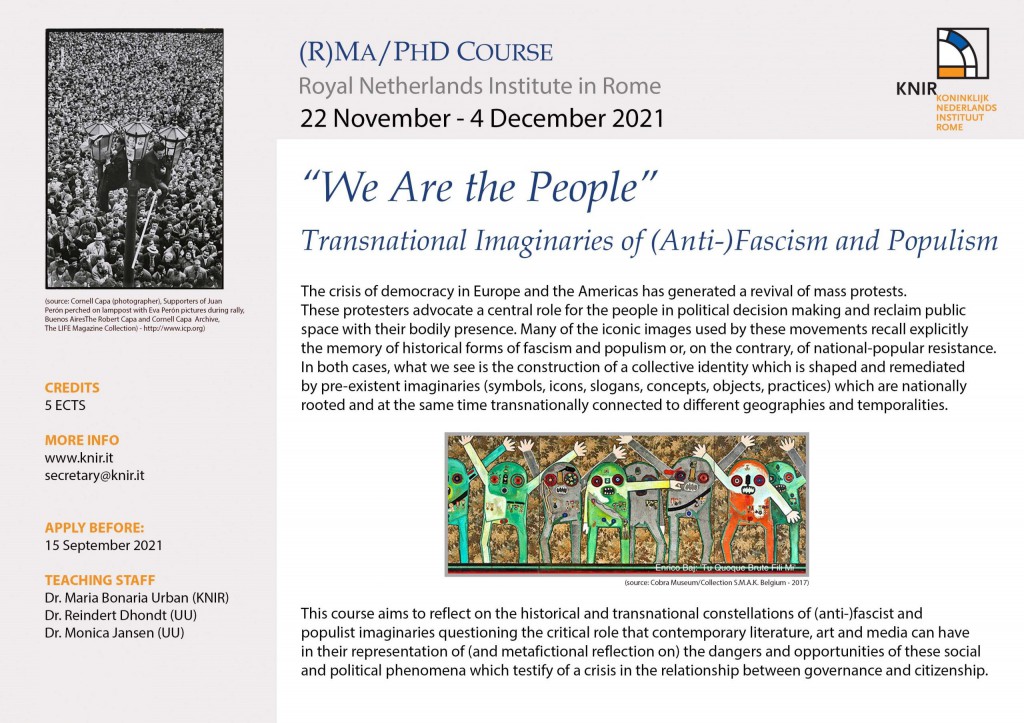Seminar: “We Are the People” – Transnational Imaginaries of (Anti-)Fascism and Populism
Date: 22 November – 4 December 2021
Deadline for applications: 15 September 2021
Course content
The crisis of democracy in Europe and the Americas has generated a revival of mass protests. These protesters advocate a central role for the people in political decision making and reclaim public space with their bodily presence. Many of the iconic images used by these movements recall explicitly the memory of historical forms of fascism and populism or, on the contrary, of national-popular resistance. In both cases, what we see is the construction of a collective identity which is shaped and remediated by pre-existent imaginaries (symbols, icons, slogans, concepts, objects, practices) which are nationally rooted and at the same time transnationally connected to different geographies and temporalities. The past ages of mass migrations and colonialism and the present age of postcolonial and global mobilities cannot be separated from the resurgence of nationalist sentiments which travel transnationally within “cartographies of diaspora” (Brah 1996). This is especially the case for the transatlantic mobilities of (anti)fascist and populist imaginaries between Italy, Spain, Latin and North America, which will be the special focus of this course. We will therefore depart from Argentine historian Federico Finchelstein’s suggestion that fascist ideologies are best studied from the margins and modern populism was born out of fascism (Finchelstein 2017: XI, XIII, 125).
Starting from these preliminary observations, this course aims to reflect on the historical and transnational of (anti-)fascist and populist imaginaries questioning the critical role that contemporary literature, art and media can have in their representation of (and metafictional reflection on) the dangers and opportunities of these social and political phenomena which testify of a crisis in the relationship between governance and citizenship. In order to address the social relevance of the topics discussed in this course, the lectures will be structured around three poles: (1) the genealogies of the critical concepts studied in this course; (2) the production and reception of the artistic representations that will be our object of close reading; and (3) the practices of public art and activism which can be visited on location in Rome. Students will work on different topics which connect transversally to the three dimensions of the course and which can be linked to the urban cityscape and cultural heritage of (anti-)fascist and populist Rome. Central to these will be the fascist cults of Mussolini and Franco whose messianic imageries will be analysed in relation to the two-headed populist cult of Peronism in Argentina, around leader Juan Perón and his charismatic wife Evita, and in connection to their (counter-)narratives produced in the diasporic space and time of transnational communities.
Staff
Dr. Maria Bonaria Urban (KNIR)
Dr. Reindert Dhondt (UU)
Dr. Monica Jansen (UU)
Guest lecturers to be announced.
Target group
The course is open to a maximum of 15 selected (RMA) and PhD-students in modern languages, (cultural) history, general and comparative literature, heritage studies, cultural studies or related disciplines from KNIR partner universities (Universiteit van Amsterdam, Vrije Universiteit, Universiteit Leiden, Universiteit Utrecht, Radboud Universiteit, Rijksuniversiteit Groningen).
Course format and assignments
The course is organized by and hosted at the Royal Netherlands Institute in Rome (KNIR). It consists of a 12 days intensive seminar period in Rome, with lectures, on-site visits and discussions. During the seminar, each participant delivers an oral presentation either at the institute or in situ on a topic of her/his choice. Before and after the seminar participating students work independently on two written assignments:
- a written preparatory assignment (1.500 words), deadline 15 October 2020, 18.00h.
- a concluding essay (6.000 words), deadline 23 December 2020, 18.00h.
Credits and assessment
The study load is the equivalent of 5 ECTS (in case 6 ECTS is needed for programmatic reasons an extra study-load of readings and paper-length can be added to meet the requirement). Each student should arrange with his/her home coordinator whether the course can be a part of the existing curriculum. After successful completion of the course the KNIR provides a certificate mentioning study load and evaluation.
The study load is based on:
- a) Before the seminar in Rome: independent study of course materials and preparatory assignment of 1.500 words: 1 ECTS;
- b) Intensive seminar in Rome (9 days): active participation, oral presentation and essay proposal: 3 ECTS;
- c) After the seminar: essay of 6.000 words: 1 ECTS.
Assessment takes place on the basis of preparatory assignment, based on the study of course material (20%), active participation and on-site presentation (30%), and the concluding essay (50%).
Literature
Ben-Ghiat, Ruth. Strongmen: Mussolini to the Present. New York: W.W. Norton & Company, 2020.
Finchelstein, Federico. From Fascism to Populism in History. Oakland, California: University California Press, 2017.
